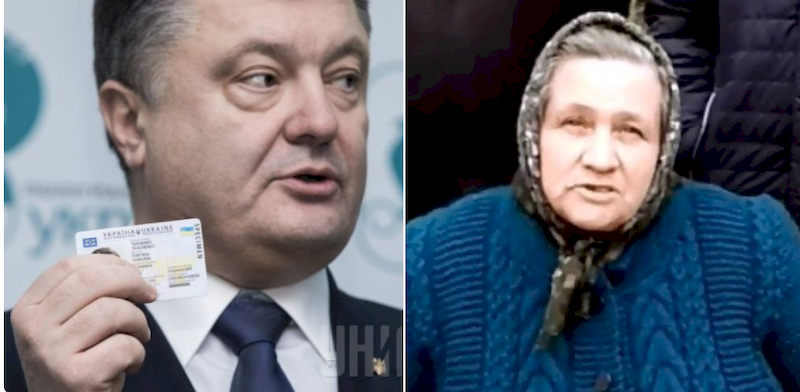New law in Ukraine would strip citizenship of Crimean victims of Russian occupation

Ukrainian President Petro Poroshenko has proposed amendments to the Law on Citizenship which, if passed, would deprive Crimeans of their Ukrainian citizenship for actions forced on them by Russia as occupying state. There are other amendments in draft bill 8297 which are likely to be controversial, but those directly affecting Crimeans seem insultingly ill-considered.
Ukraine in principle does not allow dual citizenship, with Article 19 of the Law on Citizenship stating that “Ukrainian citizenship is lost if a citizen of Ukraine has voluntarily acquired the citizenship of another state after attaining his/her majority”.
There are virtually no real mechanisms for imposing this ban on dual citizenship, and it is fairly often quietly ignored. The Laws on occupied territories also stipulate that this ban does not apply to Crimeans under Russian occupation, since Russia has made it next to impossible to get a job, get medical treatment, etc. without a Russian passport.
The first amendment to Article 19 proposed in No. 8297 is uncontroversial. A fifth item is added to the list of circumstances that are not deemed to be voluntary acquiring of another country’s citizenship, namely taking on Russian citizenship in occupied Crimea.
Problems arise immediately, however, since the very next paragraph states that this exception shall not apply if the adult Ukrainian citizen “exercised electoral or other rights allowed by the foreign citizenship, or carried out duties which the foreign citizenship imposes….”
This would appear to mean that Ukrainian citizens forced to take on Russian citizenship because Ukraine was unable to defend Crimea from Russian invasion in 2014 could still be stripped of Ukrainian citizenship if forced to do Russian military service or to take part in Russian elections.
Neither of these two situations can be considered circumstances which are or were within the person’s control.
Conscription
Russia has imposed conscription in occupied Crimea, and is now forcing young Crimeans to serve in Russia. This is in grave violation of the Geneva Convention relative to the Protection of Civilian Persons in Time of War which clearly states (in Article 51) that “The Occupying Power may not compel protected persons to serve in its armed or auxiliary forces. No pressure or propaganda which aims at securing voluntary enlistment is permitted”.
There is bitter irony in the amendments proposed by Poroshenko given the complaints which human rights activists have received from some young conscripts in Crimea who say they have been placed under pressure from the Russian defence ministry to renounce their Ukrainian citizenship.
The Law on Citizenship already contained and would retain the following grounds for loss of Ukrainian citizenship: “Voluntarily entering into military service of another state which, in accordance with the legislation of that state, is not a military duty or alternative service”.
This would suggest that military service imposed by Russia would not count, yet the words added earlier (“or who carried out duties which the foreign citizenship imposes….” would surely include conscription.
Elections
Whoever decided that Crimeans who took part in Russian elections illegally held in Crimea could be regarded as having ‘voluntarily’ given up their Ukrainian citizenship was not following events in Crimea in the run-up to Russia’s so-called ‘presidential elections’ and on ‘Election Day’. The event called a presidential election on March 18, 2018 was always going to provide Vladimir Putin with his fourth presidential term, but the Kremlin, like in Soviet times, wanted the statistics to look good.
There were numerous cases reported where public sector workers were told they would be dismissed if they did not turn up at the polling stations. One quite elderly Crimean Tatar woman was thrown out of hospital because she did not want to take part in the elections, and it is likely that hers was not the only such example. There was massive pressure both on teachers and on parents whose children were given the task of providing posters with photos of themselves with their parents at polling stations.
There are other concerns over this bill, with some only exacerbated by politically-motivated breaches of the Law on Citizenship over the last year or more. Poroshenko’s decision in July 2017 to strip Mikheil Saakashvili, former Georgian President, Odesa Oblast Governor and political opponent, of his Ukrainian citizenship was claimed to be because Saakashvili had ‘concealed’ the criminal proceedings against him in his native Georgia.
Those proceedings were well-known when, in 2015, Poroshenko bestowed Ukrainian citizenship on Saakashvili who was soon afterwards stripped of his Georgian citizenship.
Poroshenko’s action with respect to Saakashvili (and possibly also with the earlier removal of Ukrainian Andriy Artemenko’s citizenship) was in violation of Article 19 of the Law on Citizenship. This makes it impossible to remove a person’s Ukrainian citizenship if, by doing so, the person is left stateless.
The amendments proposed in Draft Bill No. 8987 would also enable a person to be stripped of their citizenship if they had not renounced their foreign citizenship within the space of two years. The experiences of Saakashvili, as well as Sasha Borovik who was stripped of his obtained Ukrainian citizenship at the same time as Artemenko, would surely make other citizens of a foreign state think long and hard before complying with this requirement.
These are only some of the concerns raised by the highly worrying draft bill tabled by President Poroshenko as urgent.





